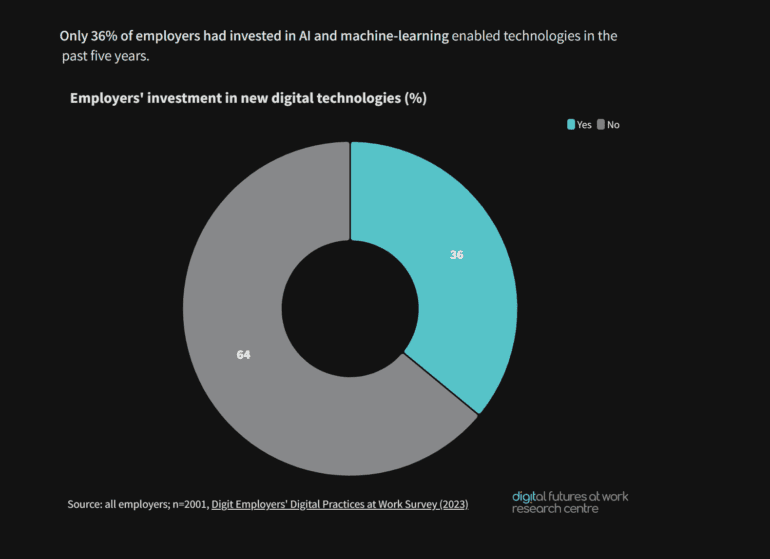TL;DR:
- Only 36% of UK companies have incorporated AI into their operations.
- Merely 10% of employers plan to increase their investments in AI.
- A significant challenge lies in the scarcity of skilled professionals in digital technologies.
- Approximately 75% of employers struggle to find individuals with the necessary digital skills.
- Troublingly, just 10% of employers are willing to invest in training programs.
- Investing in digital training is crucial for companies to effectively utilize AI.
- Failure to adapt to AI may hinder companies from capitalizing on productivity gains.
- Employers must bridge the gap between willingness and action to stay technologically competitive.
Main AI News:
In the rapidly evolving world of technology, machine learning and other forms of artificial intelligence (AI) are often hailed as the key to success. However, recent findings indicate that the adoption rates of these transformative technologies remain surprisingly low. A comprehensive survey conducted by the esteemed Digital Futures At Work Research Center has unveiled a disheartening truth: a mere 36% of UK-based employers have integrated AI into their operations.
Even more concerning is the revelation that most of these companies have no plans to ramp up their investments in AI in the foreseeable future. Astonishingly, only 10% of the employers surveyed expressed an intention to increase their engagement in this burgeoning field. Such statistics cast doubt on the widely held belief that the AI revolution is an unstoppable force.
The primary obstacle hindering widespread AI adoption lies in the shortage of professionals equipped with the necessary digital skills. A staggering 75% of employers reported difficulties in finding individuals possessing the requisite knowledge to effectively incorporate AI into their workflows. This scarcity of digital talent poses a significant challenge to companies seeking to leverage AI’s potential.
Curiously, only a mere 10% of these employers are willing to invest in comprehensive training programs to bridge this skill gap. This trend is deeply concerning, as it may impede these organizations from reaping the substantial productivity gains associated with widespread AI utilization. It is increasingly evident that investing in digital training is not merely a luxury but an imperative for companies aiming to harness AI’s transformative power.
The adoption of AI demands a departure from archaic work processes. Failure to adapt to the digital era may result in companies falling behind their AI-savvy counterparts. To stay competitive and capitalize on the advantages AI offers, employers must embrace the inevitable and invest in digital training programs. The findings from the survey underscore a stark disparity between what employers are currently willing to do and what they must do to remain technologically relevant.
Conclusion:
The survey reveals a concerning trend in the UK market, where AI adoption remains low among companies. The scarcity of professionals with the requisite digital skills poses a significant challenge to organizations aiming to leverage AI’s potential. Moreover, the reluctance to invest in training programs hampers the ability to fully capitalize on the productivity advantages offered by AI. To stay competitive in the evolving market, employers must prioritize digital training and bridge the gap between intention and action in adopting AI technologies. Failure to do so risks falling behind AI-savvy competitors and missing out on the transformative power of AI.

